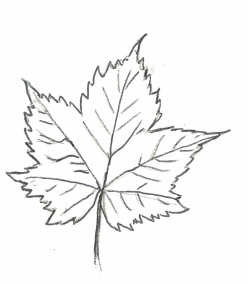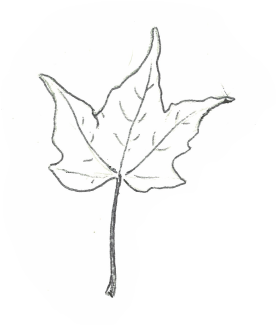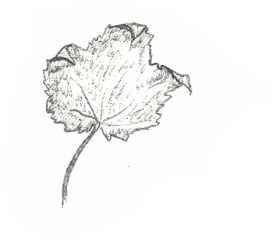I saw Allen the other day in the Great Hall, kneeling
backwards on one of the couches, playing with a maple leaf. No one else was
around, and the room was dim, quiet, and cool at mid-day. The leaf looked funny
to me, for some reason.
“Hi, Allen. What are you doing?” I greeted him.
“Herding penguins by moonlight,” he answered, with a smile.
It’s one of Charlie’s smart-ass lines, but when Charlie says it he does it with
a straight face and a bit of a grumble.
When Allen said it, it was like I was in on the joke.
“No, I mean why are
you playing with a maple leaf?” I amended.
“Because it’s pretty,” he told me, simply. And it was—the trees
are coloring up nicely now. The ridge behind campus looks like a mountain of
Fruity Pebbles, and the leaf Allen held was bright orange and very large. “I
picked it up on my way into campus this morning.”
“It looks strange.”
“It’s not from campus. I think all ours are redder than
this. You’re studying trees with Charlie, right?”
“Yeah.”
 |
| Mountain Maple |
my hand. It was unquestionably a maple leaf, but the shape was off a bit, unfamiliar. I closed my eyes and let my memory well up. There wasn’t a match on campus. It was no one I knew.
“I know what it isn’t,” I told Allen. “It’s not a sugar
maple or a red maple. There are other maples, but I don’t know them.” I spun
the leaf stem—the petiole—between my finger and thumb and the big leaf twirled
around like a flag. I asked Allen if he knew it. He shook his head.
“Not really my thing. I know it’s a maple….”
“Where is the tree?”
“Across the street from the main entrance and down a bit,
maybe one property over. It’s one of the ones Charlie’s crew collects leaf
mulch from.”
 |
| Ash-leafed Maple |
“Allen?” I sat down next to him on the couch.
“Mmm?”
“How do you stay interested in your magic? You know how it
works. Doesn’t that take the…well, magic out of the trick?” I’d been thinking
about this. I don’t have to choose a magic master until next year, but I’ve been
thinking about who I’ll choose and it’s a kind of difficult thing because I’m
not sure I really believe in spells and energies and so forth. Allen would be a good choice, because at least I know
everything he does in his stage magic is real, but I don’t think I want
to learn how his tricks work. I don’t think I want to know. Allen turned and
sat properly on the couch, looking, for a moment, like a very small boy
climbing around.
“What do you mean, take the magic out of it?” He prompted me.
“I don’t know, the…fun part. The thing that makes it feel
magical?” It was circular, and I expected him to call me on it. He didn’t.
“You mean…this?”
He suddenly pulled a bouquet of silk flowers out of nowhere. I jumped with
surprise and laughed.
“Yes, that.”
“The way you feel when I do that, not the flowers
themselves.” The flowers vanished again, but casually, as though he were simply putting them away.
“Right.”
 |
| Striped Maple |
“I don’t think that’s my thing,” I told him.
“No, I don’t think so, either. Hard to say, though. I wouldn’t rule
anything out.”
“I don’t know.”
“I mean, how should
I choose?”
“I don’t know that there’s any should about it. What kind of magic do you want to do?”
“That’s the problem. I don’t particularly want to do magic. I don’t care. I don’t know that I believe in magic, even.” It felt like a very deep admission, confessing my lack of faith in this thing everybody around me seemed to take for granted. Someone crossed the room behind me, I didn’t see who, and Allen and I were both silent while she passed. She didn’t interrupt or even greet us.
“That’s the problem. I don’t particularly want to do magic. I don’t care. I don’t know that I believe in magic, even.” It felt like a very deep admission, confessing my lack of faith in this thing everybody around me seemed to take for granted. Someone crossed the room behind me, I didn’t see who, and Allen and I were both silent while she passed. She didn’t interrupt or even greet us.
“You don’t need to believe in something in order to learn
how to do it,” Allen told me, “you learn how to do it, and that way you
discover how it works and that it
works. Try talking to Kit about it. Why did you come here, if not to do magic?”
He didn’t sound surprised or disapproving of my revelation; he just wanted me
to clarify myself, as he always does. I
think I remember telling him, months ago, that I’d come here to “learn to do
magic like Harry Potter.” Maybe he remembered it, too. He remembers most
things.
“I wanted—I want—to belong to a place where people learn to
do magic. I want to be inside the
magic, I want to belong to that
wonder. But I can’t think of anything I’d
like to do with a spell that I can’t do better for real.” Did I really put it
that way? Wow, that’s telling.
“I suggest you learn whatever type of magic best helps you
feel like you belong, then,” Allen suggested.
For a moment I so wanted to ask him to be my magic teacher.
I almost said the words. But I was right when I said it earlier; stage magic
just isn’t my thing. I handed the leaf back to him and I went on my way.
I also have to pick a healing master next year—of the six
areas, I’ve already got spirit and athletics squared away, and I don’t need art
because I have advanced standing there. And I plan to ask Charlie to be my
craft master in horticulture and landscape design—I like the work, and I can
make good money as a landscaper, later, if I don’t manage to figure out what
else I want to do. So that leaves magic and healing. And healing’s a problem,
like magic, because I never felt any particular impulse to do it.
 |
| Silver Maple |
It works best for people who come here with some medical
training already—I’ve heard there have been novices who were already doctors or
herbalists and simply needed help learning bedside manner or something like
that. And Allen was part way through his psychology degree when he came here as
a student. Otherwise…you can either prepare for some kind of advanced degree
program, like how some of Allen’s students graduate with a concentration in
psychology and go on to graduate school, or you can learn something that doesn’t
require as much study, like you can become a paramedic or a vet tech or a
massage therapist, something like that.
I can’t see myself doing any of that.
But Joy teaches this thing called Reiki, and I think maybe I
can do that. It’s a kind of laying on of
hands, something to do with energy.
You get a series of “attunements” and learn certain symbols. Joy will sign off
on a novice who gets the first two attunements and logs a hundred hours or more
of practice time. I’m not sure I believe in Reiki, either, but unlike Kit’s
spell-work group, anybody can go to Joy’s Reiki group and check it out. So I
did.
 |
| Sugar Maple |
We met on a Saturday afternoon, six of us, plus Joy, in one
of the classrooms in Chapel Hall. Joy brought a portable massage table, and I
got on it. I was the only one there who wasn’t studying Reiki myself, and they
have a rule that visitors always get first chance on the table. I didn’t think
I was in any particular need of healing, but they said I could get on the table
anyway, if I wanted to. And of course I wanted to, because how else was I to
find out what it was all about.
So I lay there, fully clothed, on my back and the others put
their hands on me. And I…it’s not that I blacked out, but my focus turned suddenly
inward, so that I could feel—almost see—the texture and tension of each part of
my body, but I was barely aware of anything else. Sometimes I heard the others
whispering to each other, but I could not hear what they were saying, nor did I
wish to. The feelings in my body shifted and changed, like some fluid was
oozing or soaking through me. I felt relaxed. At one point I heard a woman’s
voice—I’m not sure whose—ask “can you feel my hand on your belly?” I said yes,
and I could, though the sensation was strange. It was almost like a puddle of
warm but nearly weightless liquid rested there. “I’m not touching you,” the
voice informed me. And yet I felt it.
 |
| Red Maple |
After a while, the others helped me to sit up and then stand—my
body felt strange, very tall and big, somehow. Joy hugged me and held me for a
while. “I don’t know why I’m crying,” I told her hair.
“That’s ok,” she told me.
So.
The next day I went across the street and looked up the tree
Allen had found. It’s a Norway maple.
[Note; the inside corners, or "sinuses" of sugar maple leaves are distinctively rounded, but they look pointed in the picture because the corners normally wrinkle a bit. Also, contrary to popular belief, leaf shape alone is not a reliable way to identify most trees, even maples.]
[Next Post: Monday, October 7th: Fall]
 |
| Norway Maple |
[Note; the inside corners, or "sinuses" of sugar maple leaves are distinctively rounded, but they look pointed in the picture because the corners normally wrinkle a bit. Also, contrary to popular belief, leaf shape alone is not a reliable way to identify most trees, even maples.]
[Next Post: Monday, October 7th: Fall]

No comments:
Post a Comment